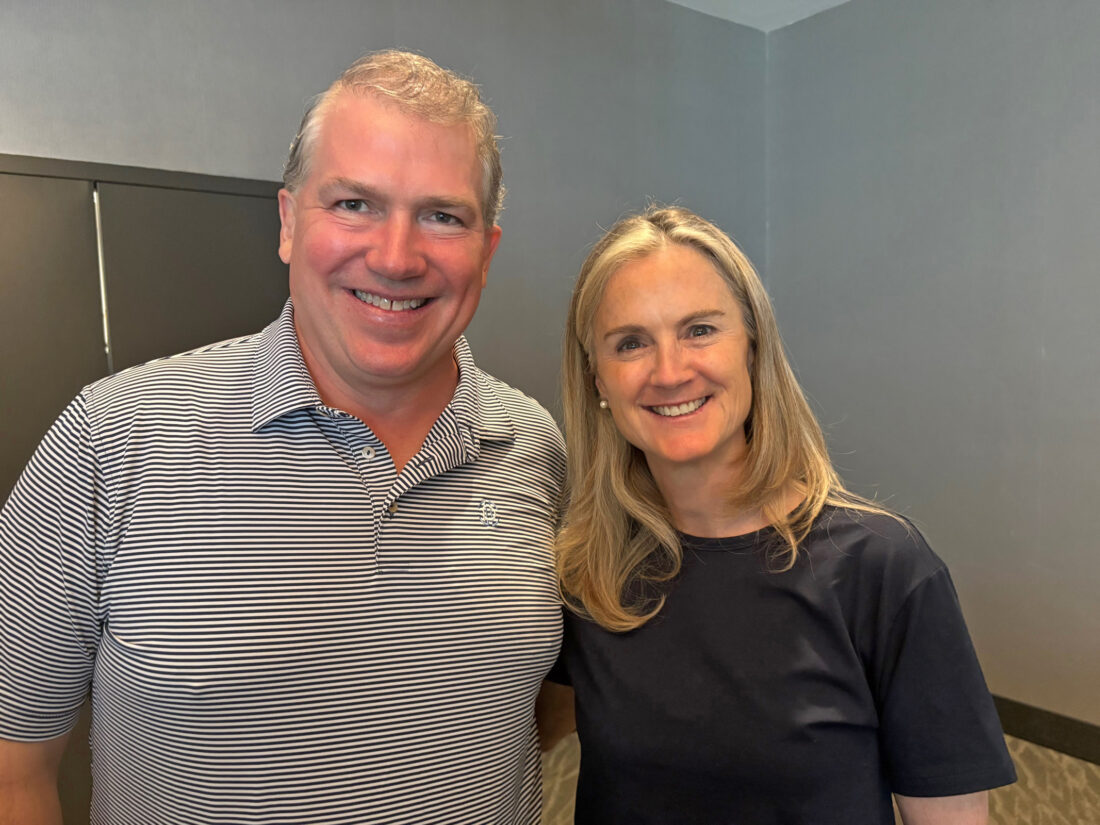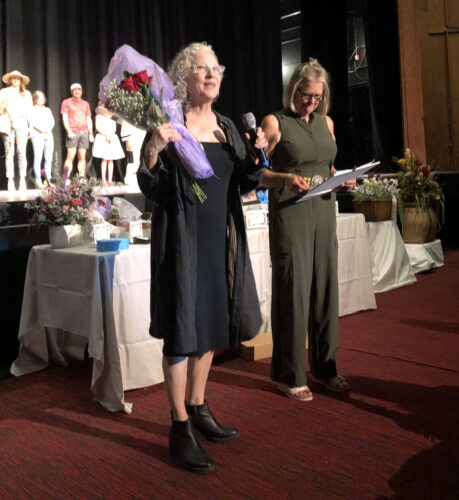ON THE SCENE: In praise of aging regional authors

Jon Donk, the new chair of the Lake Placid Institute, author Christopher Shaw and Cathy McGraw, chair emeritus of the Institute (Provided photo — Naj Wikoff)
Author Christopher Shaw used his Lake Placid Institute opening Adirondack Roundtable Lecture on Saturday, July 12 to praise regional authors, a description often used to deride such writers as being less than noteworthy.
However, there are many examples of celebrated regional writers whose works have garnered national and international praise, such as Flannery O’Connor, William Faulkner and Mark Twain. Closer to home are the late Russell Banks, who had two of his novels adapted into Academy Award-winning films, and William Kennedy, who won a Pulitzer Prize and a National Book Critics Circle Award for “Ironweed,” part of “The Albany Cycle.”
While Shaw’s books have not quite reached the same national stature, his reading from his latest Cold War novel, “The Manager,” set in Lake Placid two years after the Miracle on Ice, demonstrated that his writing is first-rate and he is worthy of the highest praise.
Shaw is a former Adirondack guide, editor of Adirondack Magazine and a retired professor of writing at Middlebury College. Shaw, who grew up near Schenectady, first moved to the Adirondacks in 1969. He was attracted to the region in equal measure by its apparently inhospitable climate and as a place that attracted such luminaries as Ralph Waldo Emerson, James Russell Lowell and William James Stillman, who participated in the 1858 Philosophers’ Camp on Follensby Pond.
As quoted in a 2007 New York Times article, Shaw said, “My own experience in nature had made me curious as to how places as much as cultures could produce distinctive expressions of thought and art.”

Doug March and Lex Dashnaw (Provided photo — Naj Wikoff)
Shaw’s love for the Adirondacks has never wavered, even when a work opportunity lured him across the lake to Vermont, as reflected in his now fifth book set in the region, “The Manager,” a follow-up to “The Power Line,” his terrific exploration of bootlegging in 1929. Since his arrival, Shaw’s curiosity and laid-back approach provided him with insights into a deeply embedded culture that many people miss.
For many years, two centers of communication and insight were more effective than the Internet: the early morning breakfasts at Ruth’s Diner and the breakfast and mid-morning coffee breaks at Marshalls Drugs, where one could learn, among other things, about the outcomes of the latest ongoing weekly poker game. The American Legion, Arena Grill, Happy Jack’s, Handle Bar and Purdy’s in Keene were also great places for tidbits, as was Steinhoff’s in Wilmington for chatting with the after-skiing crowd. Shaw was known and welcomed at them all.
Shaw was and remains a good non-judgmental listener. Those skills enabled him to connect with locals and learn the history behind the glow and majesty of the Adirondacks, as well as such dazzling events as the Miracle on Ice. I think of the decades of guests who stayed at the Mirror Lake Inn without realizing the vines covering the tennis court fencing were hops, the ski hill was covered with barley, and what tales such elements told.
The spark for “The Manager” was Shaw giving the manager of the 1982 Russian B team a lift to the Lake Placid Hilton, having been recently tossed out of the team’s bus by the players on a snowy evening. Shaw found the manager, clearly out of dress for the elements, trudging along the road near Casa del Sol in Saranac Lake.
The key to Shaw’s insights was his love of talking with anyone and everyone, be it a carpenter, members of a highway crew, a ski lift operator or the owner of a local dairy, who also happened to be one of the longest-serving mayors in the state. He learned that the Adirondacks have a strong oral culture, quite evident at Rik Cassidy’s calling hours on Friday, July 11. Additionally, the Adirondacks once had a distinct regional accent, which is occasionally still heard in pockets or recalled by locals.

Ted and Kristin Ughetta (Provided photo — Naj Wikoff)
“I’m very flattered to be here, and somewhat surprised because my new novel, ‘The Manager,’ is slightly satirical towards Lake Placid in the early 1980s,” said Shaw in his opening remarks. “Some of the characters bear vague resemblances to historical figures, including Ted Farkus, head of the regional sports authority. I’m not sure we’ll read that part.”
“James (Lemons) asked me if I’d start off delivering a few remarks on the mountains as a muse for fictionalizing the Adirondacks,” said Shaw. “That was way too highfalutin a title for me to address, so I wrote one instead that I’ve titled, ‘Minor Regional Novelist Tells All.’ I had some anxiety about living up to the highfalutin title, so I’m not going to talk about the increasing number of Adirondack novels being published. The only process I can speak of is transforming the subjective experience of being Adirondack in the context of history, culture, landscape, and a quality undefinable into stories that illuminate and entertain.”
Shaw then described two forms of literature, late style and minor regional novelist, the dismissive label applied by a critic to the Texan novelist Larry McMurtry, author of “Lonesome Dove” and many other books. McMurtry gleefully printed the quote on sweatshirts, making a tidy sum in addition to the benefits garnered from his popular novels and their film rights.
Shaw said that late style referred to a troubled, dark, unresolved quality in an artist past his prime. Shaw said that as a way of avoiding being labeled a regional artist, his first book was set in Mexico, yet had such Adirondack overtones that the late Paul Jameson, former editor of the “Adirondack Reader,” urged him to set his books in the region he knows best. Shaw took that advice. He found that taking that approach freed him up; it was liberating on multiple levels, benefiting many satisfied fans. And as his recent novels demonstrate, he’s far from cresting as an author.
“It’s great fun being 75 and able to work,” said Shaw.
“The excerpt he shared about Marshalls did bring back what it was like back in the 70s and 80s,” said Lex Dashnaw. “I knew that place well, as did you, and now it’s not there, there’s no evidence that it existed.”
“I thought it was great,” said Ted Ughetta. “We were talking about his anecdote about Casa, which planted the seed for the whole story; it was like going back in time.”
“He’s a fascinating storyteller, I now want to read the book,” said Kristin Ughetta.
The next Adirondack Roundtable at 8:30 a.m. Saturday, Aug. 9 will feature Juan Souki, Executive Director of Mid Atlantic Arts, who will discuss the national funding landscape for arts and culture–where we stand today and what we can anticipate moving forward.
(Naj Wikoff lives in Keene Valley and has been writing his column for the Lake Placid News since 2005.)




